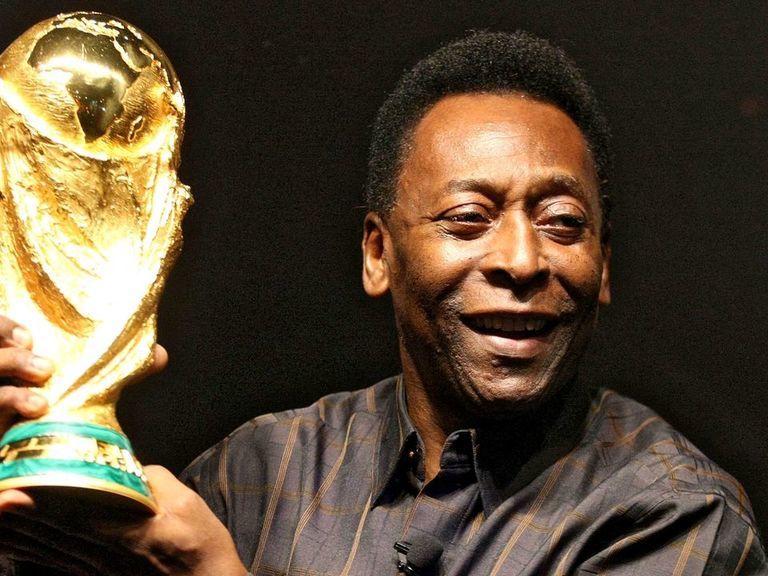Brazilian legend Pele, who won the World Cup a record three times and officially scored 767 goals across one of the most celebrated sporting careers of all time, died Thursday. He was 82.
Pele was diagnosed with colon cancer in September 2021 and began undergoing chemotherapy that month. He was recently admitted to Hospital Albert Einstein in Sao Paulo to receive treatment for a respiratory infection. The medical center, where Pele spent the last month, said he died of multiple organ failure as a result of the aforementioned cancer.
“All that we are is thanks to you,” his daughter, Kely Nascimento, wrote on Instagram. “We love you endlessly. Rest in peace.”
Nascimento announced Dec. 21 that her father’s health was worsening and that he’d spend Christmas at the hospital to receive “elevated care.” Several family members joined Nascimento at the medical facility as Pele’s cancer advanced and his condition deteriorated.
A funeral is planned for next week.
Santos, the club where Pele spent the majority of his iconic career, said the casket carrying his body will be transported to Vila Belmiro Stadium on Monday and placed in the center of the field, where fans will be able to pay their final respects. A procession will take place Tuesday through the streets of the city before a private burial that will be attended only by family.
A inspiração e o amor marcaram a jornada de Rei Pelé, que faleceu no dia de hoje.
Amor, amor e amor, para sempre.
.
Inspiration and love marked the journey of King Pelé, who peacefully passed away today.Love, love and love, forever. pic.twitter.com/CP9syIdL3i
— Pelé (@Pele) December 29, 2022
Widely considered one of the greatest soccer players ever alongside Diego Maradona and Lionel Messi, Pele enchanted fans and opponents for nearly two decades. He helped revolutionize the sport with his elegant playing style, his mesmerizing on-ball skills, and his previously unrivaled scoring ability before becoming one of soccer’s most beloved global ambassadors.
Pele, dubbed “The King,” helped Brazil win the World Cup in 1958, 1962, and 1970. His best performance came at the 1958 tournament where, as a 17-year-old, he scored six goals, including two in the final against host nation Sweden. He was hampered by injuries when Brazil retained the title four years later but was again a talisman for his country in 1970, scoring the opening goal and setting up Carlos Alberto’s memorable marker in the 4-1 victory over Italy in the final. The image of an overjoyed Pele being carried by his teammates after the final whistle remains one of the most indelible in the history of the sport.
Pele is Brazil’s joint-leading scorer with 77 tallies in 92 international appearances. Neymar equaled his idol during the World Cup in Qatar.
“Pele changed everything. He transformed football into art, entertainment,” Neymar said on Instagram. “Football and Brazil elevated their standing thanks to the King! He is gone, but his magic will endure. Pele is eternal!”
Pele bagged the majority of his goals for Brazilian club Santos between 1956 and 1974. Santos claim Pele scored around 1,000 goals in his career, but several hundred of those came in unofficial friendlies. His official scoring record, a topic of much debate over the years, is listed as anywhere from 650 goals to 1,281, depending on the source and which competitions and matches are counted as part of the tally.
His goals were only part of the story, though. Pele’s exciting style of play and imagination on the pitch made him one of the most dazzling players to ever grace world football.
His talent was evident from a young age.
Born Edson Arantes do Nascimento in the city of Tres Coracoes in the south of Minas Gerais state, Pele grew up playing on the streets in Brazil before joining Santos’ youth squad at 11 years old. His ascent through the ranks was meteoric; Pele made his debut for Santos’ senior team when he was 16, developing into the global icon who would eventually transcend the game and become the player most often associated with the phrase “The Beautiful Game” – “O Jogo Bonito” in Portuguese – that is part of the sport’s lexicon.
He joined the upstart North American Soccer League in 1975 and played for the New York Cosmos for two years, helping to propel the sport in the United States. Pele called an end to his career in 1977 after playing in an exhibition match between Santos and the Cosmos in New Jersey.
He split the game between his former clubs, playing one half for each. Some 77,000 spectators were in attendance, including Muhammad Ali, one of the only other athletes in history whose celebrity spanned the globe the same way.



